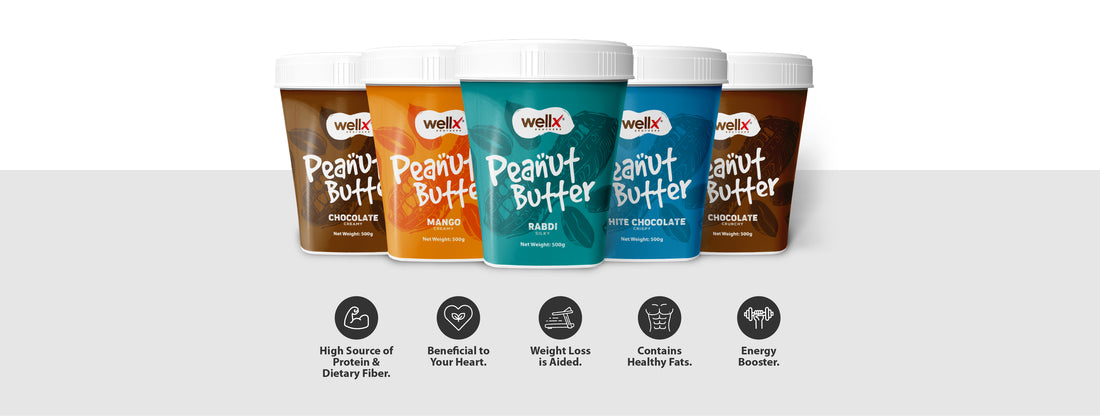Table of Contents
- Introduction
- Sustained Energy for Performance
- Muscle Recovery Support
- Nutrient Density
- Pre-Workout Peanut Butter Snacks or Meals
- Post-Workout Peanut Butter Snacks or Meals
- Benefits
- Conclusion
Introduction
Athletes are constantly pushing their bodies to the limit, requiring optimal nutrition to fuel performance and aid recovery. One underrated but highly effective addition to an athlete's diet is peanut butter. In this article, we will explore how peanut butter can benefit athletes by providing sustained energy, aiding in muscle recovery, and offering nutrient density that supports overall athletic performance.
Sustained Energy for Performance
Peanut butter is a powerhouse of energy, thanks to its combination of healthy fats, protein, and carbohydrates. These macronutrients provide athletes with a sustained source of energy, ideal for endurance sports like long-distance running, cycling, or intense training sessions. Consuming peanut butter before a workout can help maintain energy levels and delay fatigue, allowing athletes to perform at their best.
Muscle Recovery Support
After a strenuous workout, muscles need proper nutrients to recover and repair. Peanut butter contains essential nutrients like protein, which is crucial for muscle repair and growth. Additionally, the healthy fats in peanut butter help reduce inflammation and promote recovery, making it an excellent post-workout snack or ingredient in recovery meals.
Nutrient Density
Beyond energy and recovery, peanut butter offers nutrient density that benefits overall health and athletic performance. It contains vitamins, minerals, and antioxidants that support immune function, bone health, and cardiovascular health. Athletes can enjoy the benefits of these nutrients by incorporating peanut butter into their meals or snacks throughout the day.
Pre-Workout Peanut Butter Snacks or Meals
- Peanut Butter Banana Toast: Spread peanut butter on whole grain toast and top with sliced bananas for a balanced pre-workout snack rich in carbohydrates, protein, and potassium.
- Peanut Butter Smoothie: Blend peanut butter with Greek yogurt, berries, and a banana for a creamy and nutritious pre-workout smoothie packed with protein and antioxidants.
- Peanut Butter Energy Balls: Mix peanut butter, oats, honey, and dark chocolate chips to form energy balls that can be eaten before a workout for a quick energy boost.
Post-Workout Peanut Butter Snacks or Meals
- Peanut Butter Protein Shake: Combine peanut butter with protein powder, almond milk, and a banana for a post-workout shake that aids in muscle recovery and replenishes glycogen stores.
- Peanut Butter and Jelly Sandwich: Enjoy a classic PB&J sandwich on whole grain bread for a satisfying post-workout meal that provides a balance of carbohydrates, protein, and healthy fats.
- Peanut Butter Yogurt Bowl: Mix peanut butter into Greek yogurt and top with granola, fruits, and nuts for a delicious and nutrient-dense post-workout snack.
Hydration Support
In addition to its nutritional benefits, peanut butter can also contribute to hydration support for athletes. While it's not a replacement for water or sports drinks, peanut butter contains electrolytes like potassium, magnesium, and sodium, which play a crucial role in maintaining fluid balance in the body. Incorporating peanut butter into meals or snacks alongside adequate hydration can help athletes stay properly hydrated during training and competition, supporting optimal performance and recovery.
Cognitive Function
Beyond its physical benefits, peanut butter can also aid cognitive function, which is critical for athletes throughout training and competition. The healthy fats found in peanut butter, including omega-3 fatty acids, have been linked to improved brain health and cognitive performance. Consuming peanut butter as part of a balanced diet can also enhance focus, attention, and mental clarity, allowing athletes to stay sharp and perform at their peak.
Immune System Support
Intense physical activity can temporarily suppress the immune system, making athletes more susceptible to illnesses and infections. Peanut butter contains various nutrients, including vitamin E, vitamin B6, and zinc, which play roles in supporting immune function. By incorporating peanut butter into their diet, athletes can strengthen their immune system, reduce the risk of illnesses, and maintain consistent training schedules without interruptions due to health issues.
Sustainability and Cost-Effectiveness
Peanut butter offers sustainability and cost-effectiveness for athletes looking for nutritious yet affordable food options. Compared to some protein supplements or specialized sports foods, peanut butter is relatively inexpensive and widely available. It can be easily stored without refrigeration, making it a convenient choice for athletes who travel frequently or have limited access to fresh food options. Additionally, peanuts are a sustainable crop, requiring less water and resources compared to some other protein sources, aligning with environmentally conscious dietary choices.
Versatility in Culinary Applications
One of the advantages of peanut butter for athletes is its versatility in culinary applications. Besides traditional spreads or sandwiches, peanut butter can be used in various recipes to create nutritious and flavorful meals or snacks. Athletes can experiment with adding peanut butter to smoothie bowls, oatmeal, protein bars, salad dressings, and even savory dishes like stir-fries or sauces. This culinary flexibility allows athletes to enjoy the benefits of peanut butter in diverse ways, keeping their meals interesting and satisfying.
Social and Psychological Benefits
Lastly, incorporating peanut butter into food or snacks can have social and psychological benefits for athletes. Food plays a significant role in social interactions, and sharing peanut butter-based dishes or recipes with teammates, coaches, or fellow athletes can foster camaraderie and a sense of community. Furthermore, enjoying foods that athletes love, such as peanut butter, can contribute to positive psychological associations with nutrition, promoting a healthy relationship with food and overall well-being.
By leveraging these additional benefits of peanut butter, athletes can enhance their performance, recovery, and overall health while enjoying delicious and nutritious foods that support their athletic endeavors.
Conclusion
Peanut butter is a versatile and nutritious addition to an athlete's diet, providing sustained energy, muscle recovery support, and nutrient density. Whether enjoyed as a pre-workout snack or incorporated into post-exercise meals, peanut butter can fuel athletic performance and promote overall well-being for active individuals.
FAQs
-
Can athletes with nut allergies still benefit from peanut butter alternatives?
- Yes, athletes with nut allergies can benefit from seed butter alternatives like sunflower seed butter.
-
How does peanut butter compare to other protein sources for athletes?
- Peanut butter offers a balanced nutrient profile with protein, healthy fats, and carbohydrates, making it a convenient option for athletes.
-
Are there specific types of peanut butter recommended for athletes, such as natural or organic varieties?
- Natural or organic peanut butter is recommended for athletes due to their cleaner ingredient profiles without added sugars or preservatives.
-
Can peanut butter be incorporated into pre- and post-workout meals for weight-conscious athletes?
- Yes, peanut butter can be part of pre- and post-workout meals for weight-conscious athletes with a focus on portion control and balanced nutrition.


